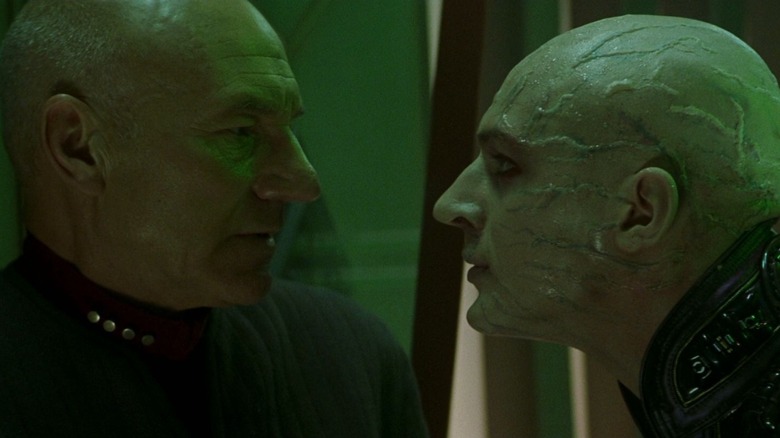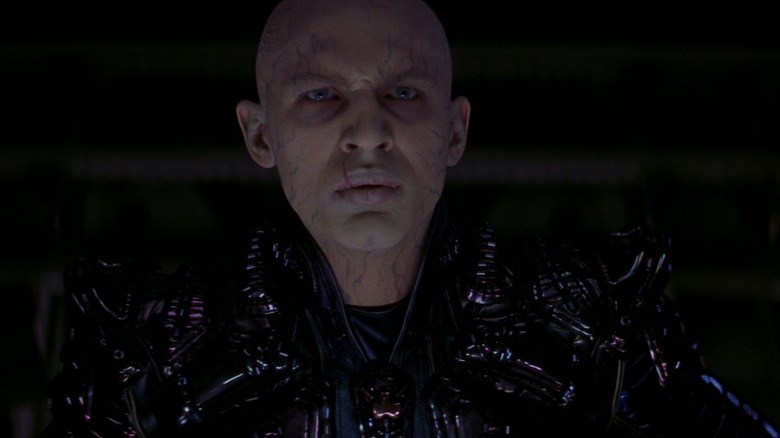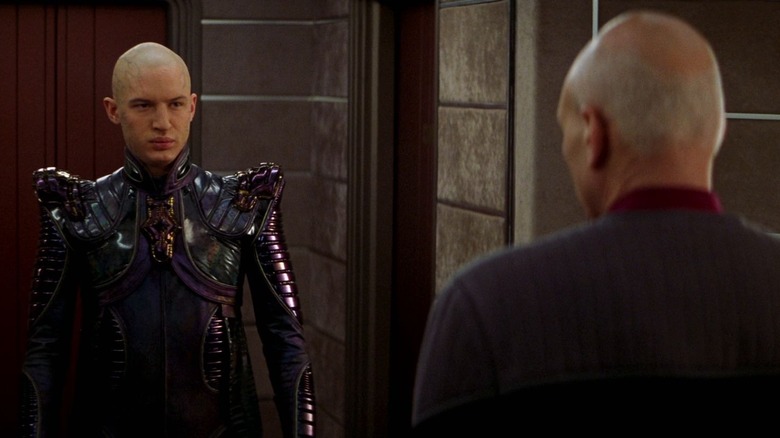Why Patrick Stewart Kept His Distance From Tom Hardy During Star Trek: Nemesis
Stuart Baird's 2002 film "Star Trek: Nemesis" came at a very strange time in the franchise's history. "Star Trek" had spent the 1990s striding triumphantly across the landscape, producing multiple hit shows, one right after the other. There was a time when "Star Trek: The Next Generation" overlapped with "Star Trek: Deep Space Nine," and then when "Deep Space Nine" and "Star Trek: Voyager" ran concurrently. "Voyager" even helped Paramount launch its own TV network, the UPN, in 1995.
By 2001, though, the bloom was off the rose a bit. The series began to tire out. "Voyager" came to an end, and audiences were looking forward to a prequel series called "Enterprise." Before the show could debut, however, the world was shaken by the events of September 11, 2001. Pop rhetoric immediately turned to mourning, and then just as quickly to combat-based retribution. The gentle diplomacy of "Star Trek" instantly became dated. Then, when "Nemesis" came out in 2002, it was wholly rejected, earning the least amount of money of any Trek film before it. "Next Generation" ended not with a bang, but a whimper.
It didn't help that "Nemesis" had a weird story. Picard (Patrick Stewart) learned that he had once been cloned by the Romulans and that the now-adult clone, named Shinzon (Tom Hardy), was leading a revolution back on Romulus. The story then devolved into a dumb revenge plot and Shinzon's doomsday weapon.
In the oral history book "The Fifty-Year Mission: The Next 25 Years: From The Next Generation to JJ Abrams" edited by Mark A. Altman and Edward Gross, Stewart recalls shooting "Nemesis," and how his on-set relationship with the young Hardy was a little distant. Stewart, knowing he was a recognizable star, wanted to make sure the up-and-coming buck Hardy was surrounded by professionals.
The young Tom Hardy
It should be acknowledged that Shinzon and Picard were written to be two completely different people. Although Shinzon is a clone of Picard, he was actually raised in a Reman mining camp, broke free of his own volition, began a revolution, and rose to become a revolutionary leader. He didn't have the memories, experiences, or personality traits of Picard. For Hardy, it was liberating, and the actor said he didn't "have to copy or mimic anything that Patrick does, which is very freeing, because suddenly you have a foundation to develop character, and then proceed to the question: 'Why would he walk like that? [etc.]."
Stewart saw a lot of promise in Hardy but knew it would be a daunting task. Stewart had spent seven years playing Captain Picard on TV and had already made three features as the character. He knew that a massive commercial enterprise like "Star Trek" invited a lot of scrutiny. Stewart made it his job to make the set comfortable for his co-star.
"I knew that Tom was nervous at the beginning. This was perhaps the largest screen role he'd had. It's not just that it was a large role, but he had to carry the weight of the antagonist in a 'Star Trek' movie. Major scenes of dialogue, complex emotions. He was a young man with really extraordinary ability and personality. I felt, as I would anyway with any younger actor, that it was absolutely essential to try to create the best atmosphere in which he could be relaxed and do his best work."
Stewart didn't intimidate Hardy, but, by the same token, didn't really socialize with him either. Indeed, the two barely spoke.
Not too genial
Stewart was always an actor first, and he famously tells a story about how he was berated in the early days of "Next Generation" for being too serious on set. It seems that his old, ultra-professional instincts kicked in when making "Nemesis," and he felt no urge to crack wise with Hardy or hang out after shooting had wrapped. He preferred their interactions to be done in front of a camera. Stewart continued:
"I never socialized with Tom, even though we were months filming this. I felt that keeping some distance between us was proper. I wanted our life to be a life in front of the camera, apart from the small talk of sitting around waiting to work, of which, even then, there was very little. If there was an edge in the relationship, I wanted it to be visible when the camera rolled. To that extent, I think both of us were cautious of the other one."
Director Baird knew that Hardy was a little intimidated working with Stewart, so he gave him a wise piece of direction. Shinzon, he explained, didn't care about a single Starfleet captain, as he felt his accomplishments as a revolutionary were already more important. Indeed, Shinzon was said to be contemptuous of Starfleet and its dry formality. He was boldly confident, and also kind of a reckless punk. The fact that Hardy was allowed to play such a confident character likely helped overcome any nerves he might have felt.
"Nemesis," sadly, wasn't a hit, and Trek movies would be put on hiatus for seven years. None of this, however, was Hardy's fault. "Nemesis" likely failed just because of changing cultural tides.


